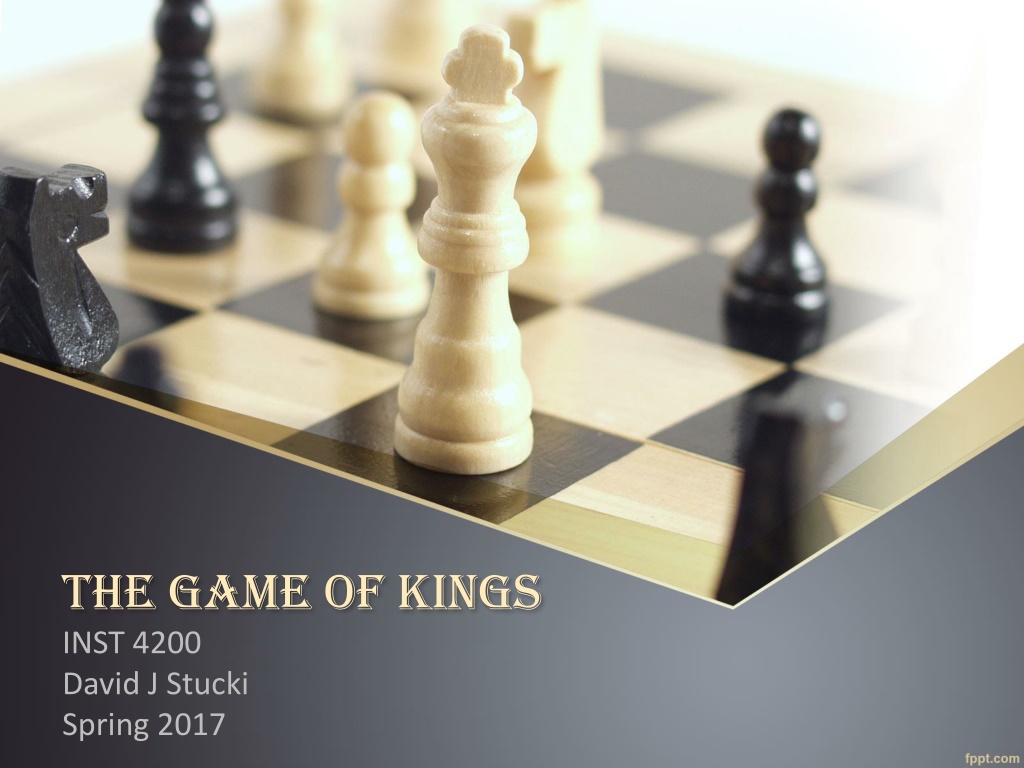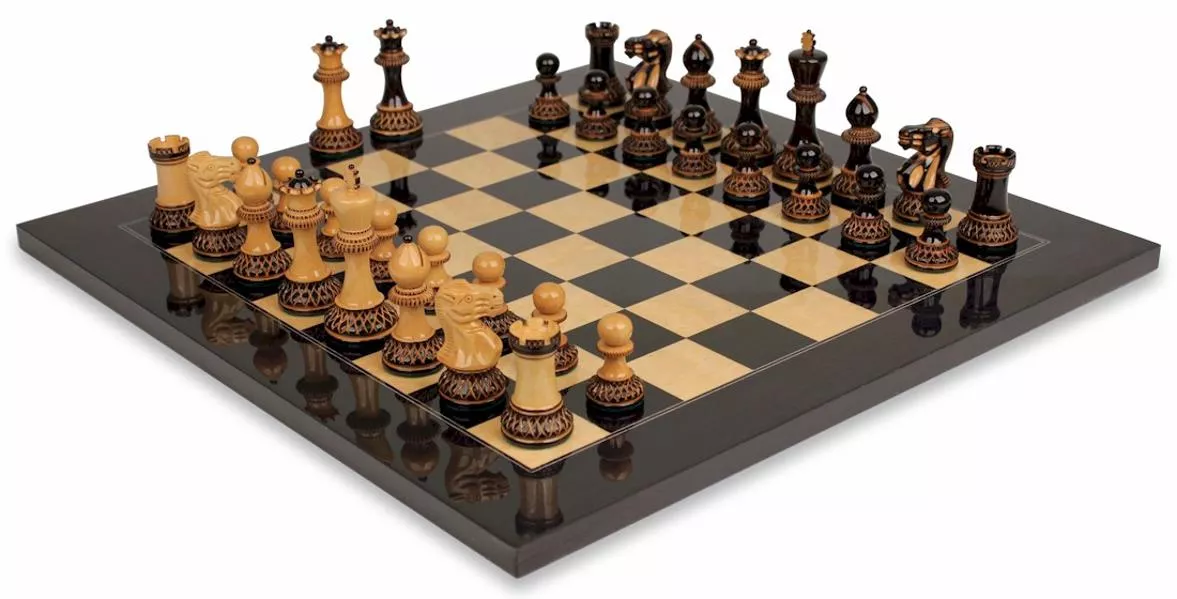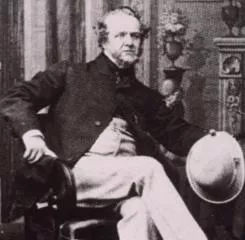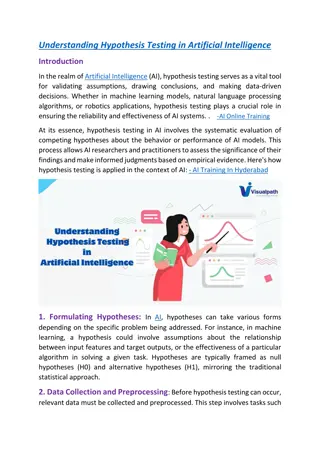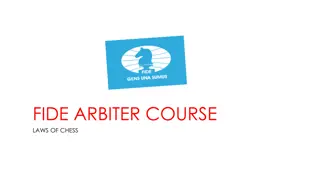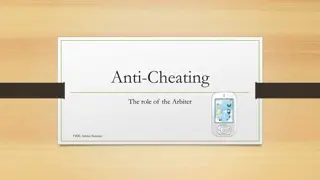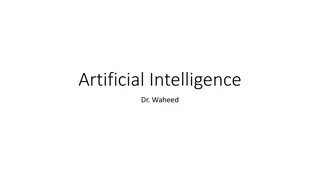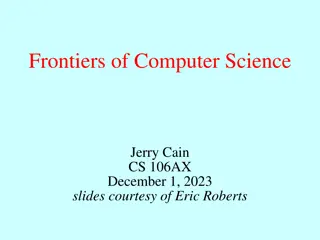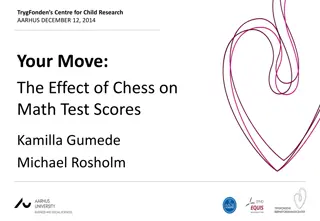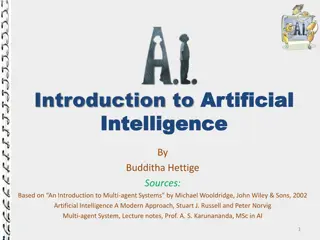History and Impact of Chess on Artificial Intelligence
Chess, originating in India over 1500 years ago, has evolved into a game that challenges human intelligence. Notable figures like Howard Staunton contributed to its modernization in Europe. The intersection of AI and chess, as seen in the development of chess-playing machines like HAL-9000 and Deep Blue, sheds light on the complexities and potential of artificial intelligence in strategic decision-making.
Uploaded on Oct 03, 2024 | 0 Views
Download Presentation

Please find below an Image/Link to download the presentation.
The content on the website is provided AS IS for your information and personal use only. It may not be sold, licensed, or shared on other websites without obtaining consent from the author.If you encounter any issues during the download, it is possible that the publisher has removed the file from their server.
You are allowed to download the files provided on this website for personal or commercial use, subject to the condition that they are used lawfully. All files are the property of their respective owners.
The content on the website is provided AS IS for your information and personal use only. It may not be sold, licensed, or shared on other websites without obtaining consent from the author.
E N D
Presentation Transcript
The Game of Kings INST 4200 David J Stucki Spring 2017
Chess Originated in India more than 1500 years ago Modern game established in Europe circa 1500 Howard Staunton standardized pieces in 1849 Chess Pieces
Wolfgang von Kempelens Mechanical Turk Constructed in 1770 to impress the Austro-Hungarian Empress Toured Europe and America for 80+ years Destroyed by fire in 1852 Video
HAL-9000 Foreword by Arthur C. Clarke 1 The Best-Informed Dream: HAL and the Vision of 2001 by David G. Stork 2 Scientist on the Set: An Interview with Marvin Minsky by David G. Stork 3 Could We Build HAL? Supercomputer Design by David J. Kuck 4 "Foolproof and Incapable of Error?" Reliable Computing and Fault Tolerance by Ravishankar K. Iyer 5 "An Enjoyable Game": How HAL Plays Chess by Murray S. Campbell 6 "The Talking Computer": Text to Speech Synthesis by Joseph P. Olive 7 When Will HAL Understand What We Are Saying? Computer Speech Recognition and Understanding by Raymond Kurzweil 8 "I'm sorry, Dave, I'm afraid I can't do that": How Could HAL Use Language? by Roger C. Schank
HAL-9000 9 From 2001 to 2001: Common Sense and the Mind of HAL by Douglas B. Lenat 10 Eyes for Computers: How HAL Could "See" by Azriel Rosenfeld 11 "I could see your lips move": HAL and Speechreading by David G. Stork 12 Living in Space: Working with the Machines of the Future by Donald A. Norman 13 Does HAL Cry Digital Tears? Emotions and Computers by Rosalind W. Picard 14 "That's something I could not allow to happen": HAL and Planning by David E. Wilkins 15 Computers, Science, and Extraterrestrials: An Interview with Stephen Wolfram by David G. Stork 16 When HAL Kills, Who's to Blame? Computer Ethics by Daniel C. Dennett
How Important is Chess To A.I.? This raises the question Can a machine play chess? It could fairly easily be made to play a rather bad game. It would be bad because chess requires intelligence. Alan Turing (1946) profoundly insightful chess-playing draws intrinsically on central facets of the human condition. Douglas Hofstadter Chess, the Drosophila Melanogaster (fruit fly) of Artificial Intelligence. Donald Michie You know, I can remember being at Harvard and back then AI was the Greenblatt Chess Program and Maxima and Eliza and people literally felt that within five to ten years that some of these tough problems would be solved. Bill Gates
Kasparov vs. Deep Blue Endgame (documentary) Game Over (documentary)
What Does It Mean? Everything? Nothing? Chess is dead. Deep Blue is not actually intelligent. The handwriting is on the wall. It was a bug, Dave Deep Blue passed the TT. The hysteria is misplaced. Be afraid. Deep Blue suffers from the same brittleness as any other expert system
The Most Human Human Getting out of the book Chess, Dating, & the Turing Test Openings & Endings vs. the Gap Pure Technique vs. Site-specificity? Mechanical humans vs. Intelligent machines? Doc, I m a corpse
And now for something completely different Rubik s Cube Robot
